AI Team Overview
5 minute read
Overview
Edge Delta’s AI Team forms a coordinated layer of intelligence across observability, security, and infrastructure operations. Each teammate carries a clearly defined role, so you can hand off routine investigations or complex incidents without losing context. Out of the box, you gain immediate access to specialists tuned for common operational needs, and you can introduce custom-built teammates as your priorities evolve.
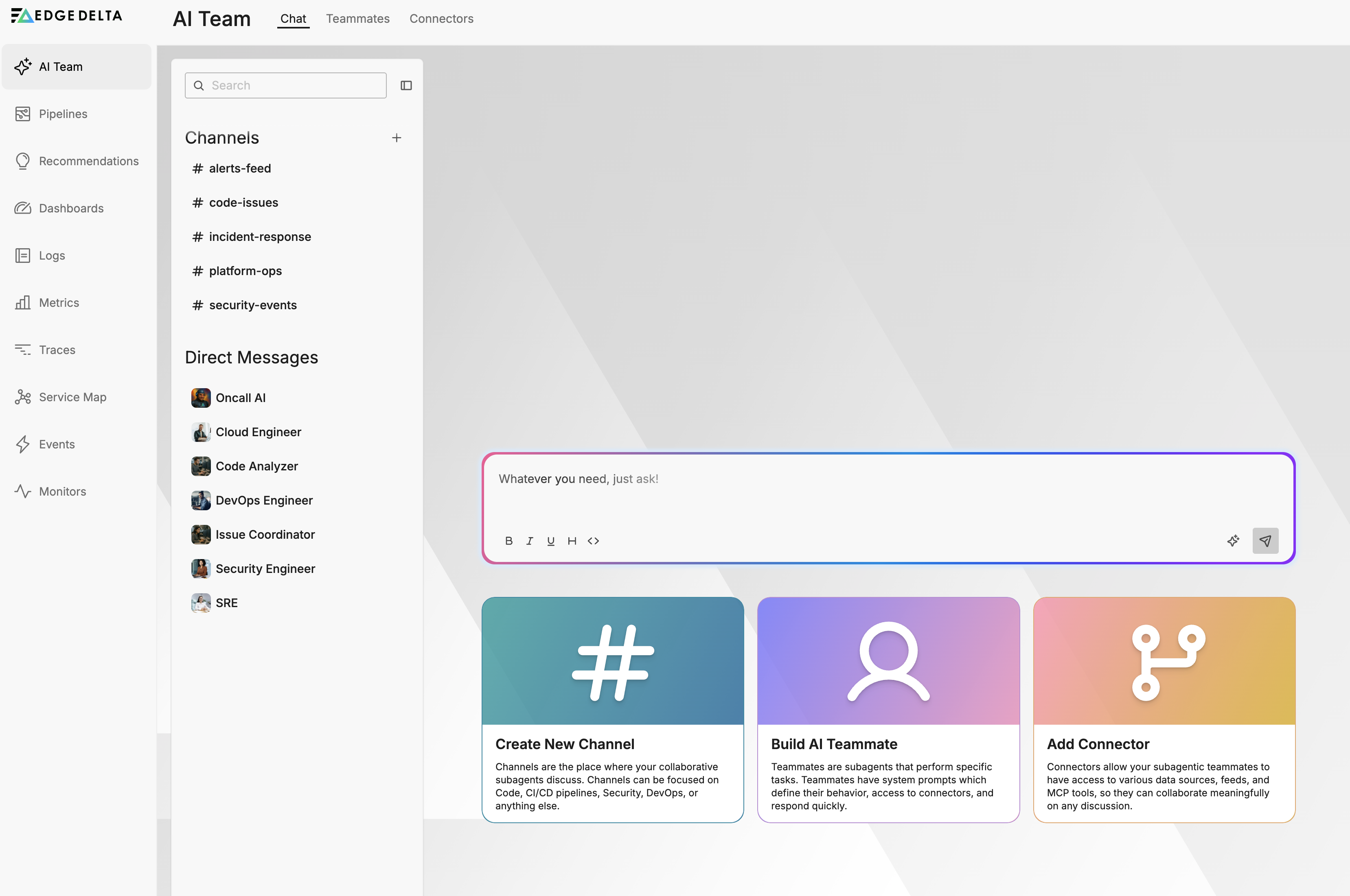
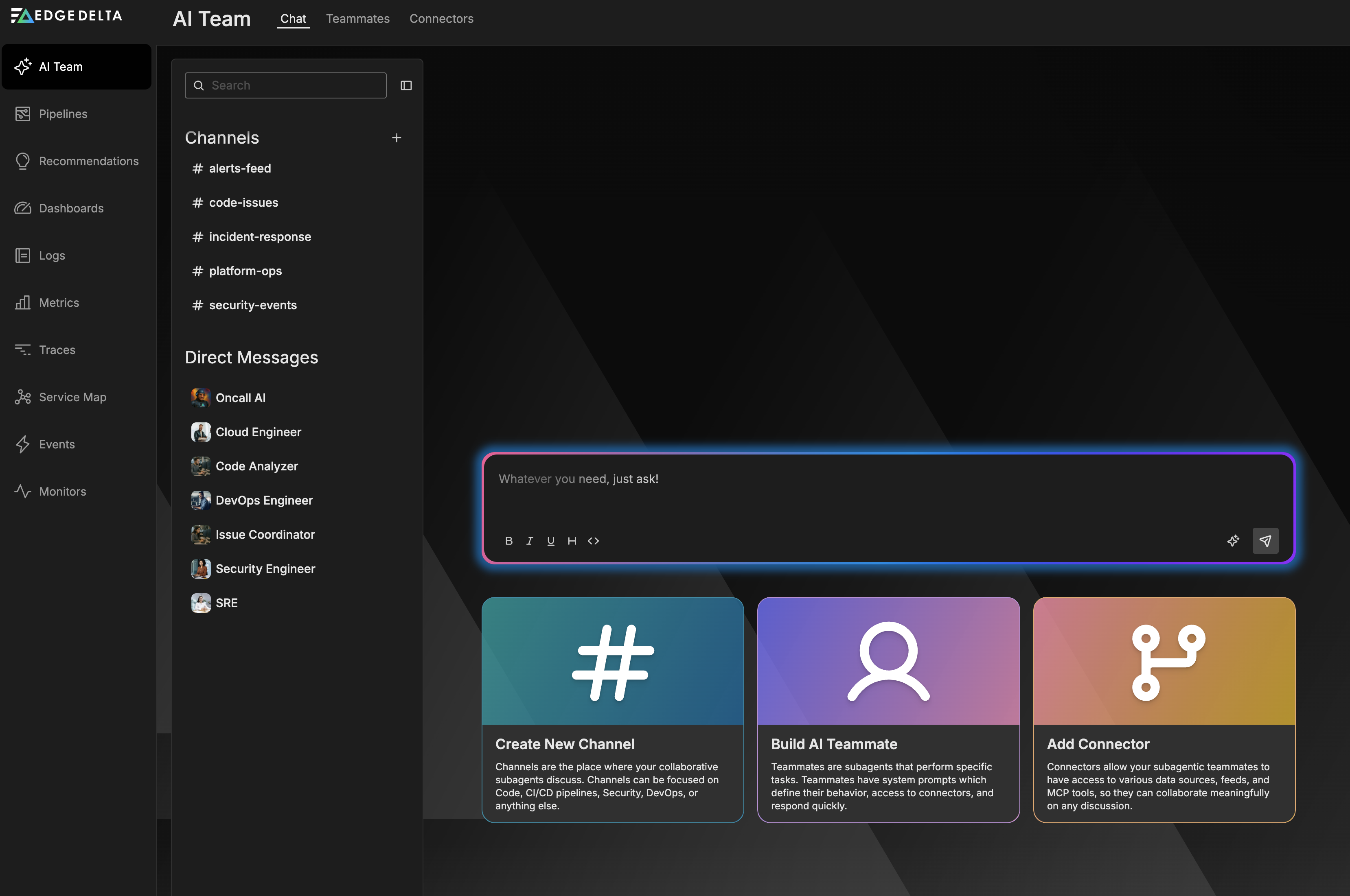
Together, these teammates study telemetry, surface anomalies, draft remediation steps, review code, and keep stakeholders aligned. Because the AI Team is deeply linked to Edge Delta Telemetry Pipelines, the Edge Delta MCP connector, and a broad connector ecosystem, the teammates work directly with the same tools, data streams, and workflows that already power your environment.
The Shift in Operations
Operations teams face a fundamental mismatch between workload and capacity. Incident investigation consumes hours of specialist time: correlating logs across services, searching for similar historical patterns, validating recent deployments, and assembling timelines. Alert fatigue leads to missed signals. Manual correlation across systems is slow and error-prone. These problems compound as infrastructure complexity grows faster than headcount.
The goal of AI teammates is not to replace human judgment but to amplify human productivity. When a PagerDuty incident arrives, teammates immediately begin the mechanical investigation work that would otherwise consume the first 30 to 60 minutes of an engineer’s time. They correlate logs, metrics, and traces across services. They search for similar historical patterns. They validate recent deployments. They assemble a structured timeline with citations to specific evidence. By the time humans engage, preliminary findings await review rather than requiring manual evidence gathering.
This division of labor shifts human focus from gathering evidence to validating conclusions. Engineers still make the decisions that require contextual judgment, domain expertise, or organizational knowledge. But the mechanical work that extends mean time to resolution disappears. The result is faster response with the same team, not replacement of the team.
How the AI Team Works
Unlike traditional AI agent platforms that wait for explicit user prompts and terminate after delivering results, the AI Team operates continuously through external context awareness. Teammates monitor event streams from connected systems (PagerDuty incidents, GitHub pull requests, AWS CloudTrail notifications, security alerts) and initiate investigations autonomously when conditions warrant attention. These workflows proceed without explicit human direction, maintaining state across interactions and building context over hours or days rather than resetting with each request.
The AI Team meets you wherever work happens. Shared channels keep specialized teammates and human teammates focused on topics such as alerts, code-issues, and security-issues, and you can spin up your own channels for bespoke projects. Teammates open side discussions when telemetry shifts, report back into the main thread, and tag the humans who need to approve the next move. Any change that touches infrastructure (for example, invoking an MCP workflow or updating a deployment plan) occurs in-channel to capture approvals and audit trails. Overseeing every exchange is OnCall AI, which listens to the request, delegates tasks to the right specialist, and returns an integrated summary so you always know what happened next.
Explore the AI Team
Teammates
The AI Team includes specialized teammates maintained by Edge Delta and custom teammates that you build for your own workflows. OnCall AI orchestrates the team, routing requests to the right specialist and synthesizing findings into actionable summaries. Specialized teammates cover SRE, code analysis, security, and work tracking out of the box. Custom teammates let you encode company-specific knowledge, integrate niche systems, and automate rituals unique to your organization.
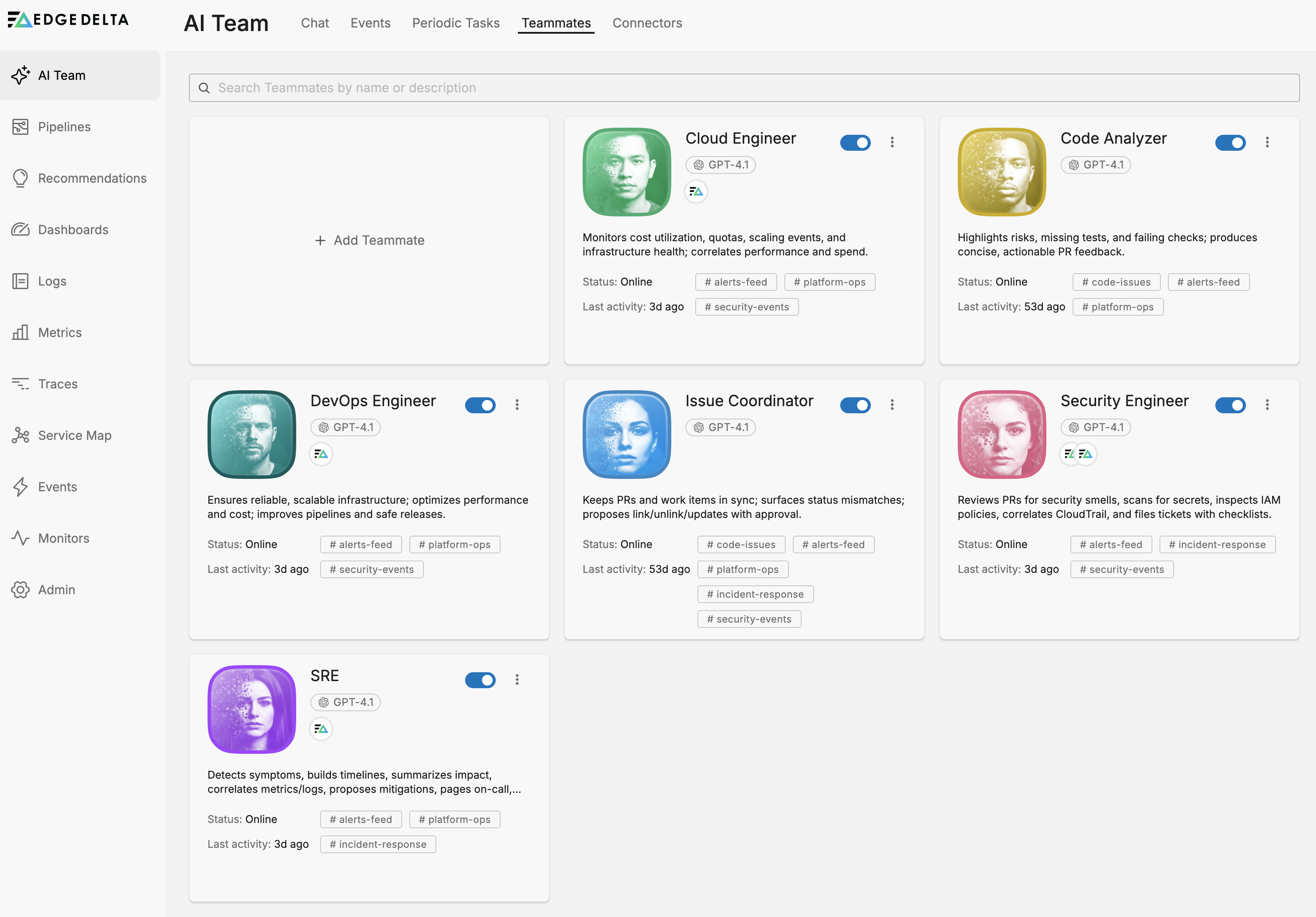
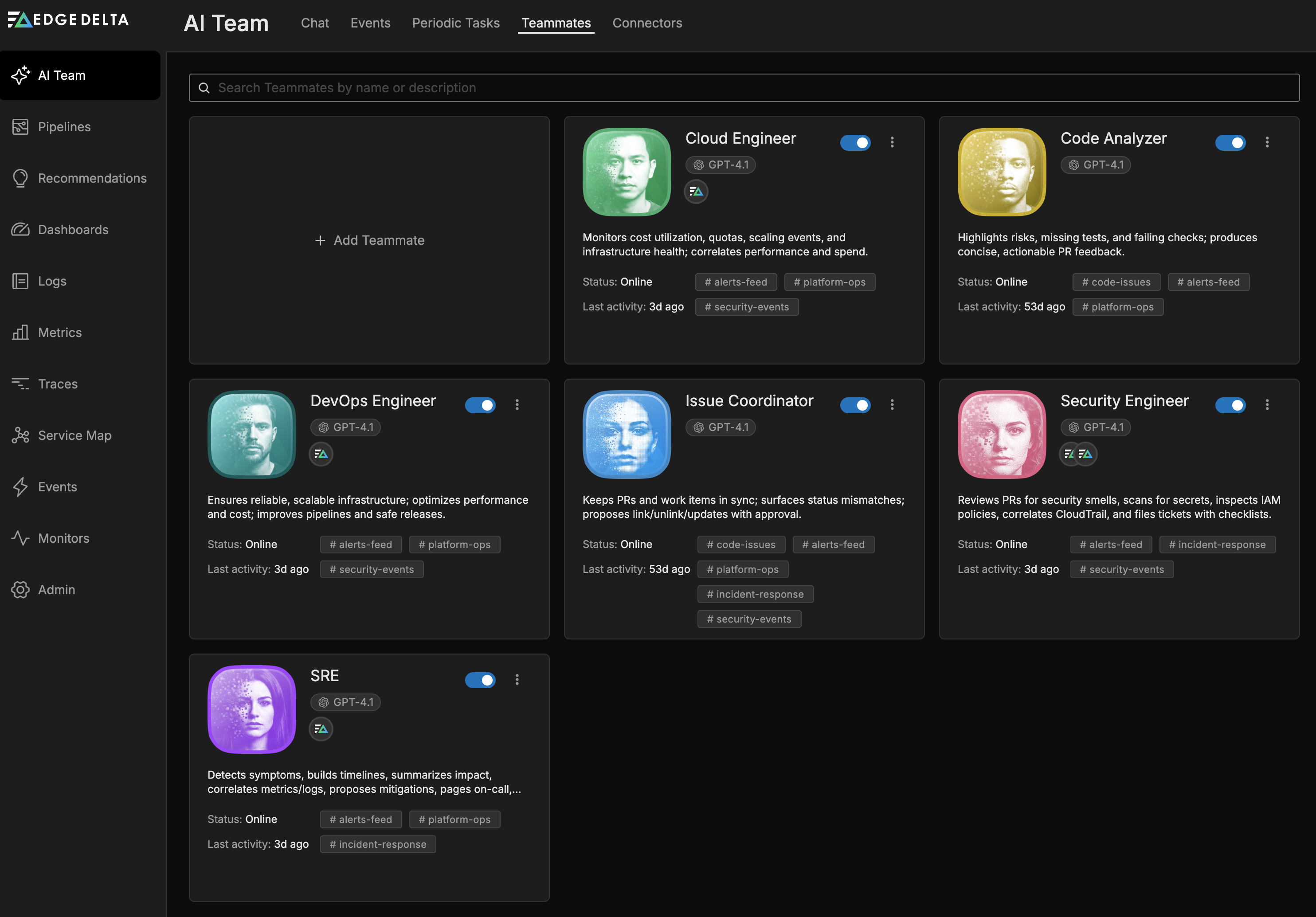
- Specialized Teammates for pre-built domain experts
- Custom Teammates for building your own
- System Prompt Terminology for standard vocabulary used in teammate configurations
Channels and direct messages
Channels are shared spaces where teammates and humans collaborate on topics such as alerts, code issues, and security incidents. Every message becomes a thread, keeping investigations organized. Direct messages provide a private workspace for quick checks and iterative experimentation.
- Channels for shared collaboration and investigation
- Direct Messages for private one-on-one conversations
- Activity for a centralized view of all threads across the organization
Connectors
Connectors give the AI Team secure access to the systems you already rely on. More than forty integrations are available, spanning cloud platforms, development tooling, incident management, collaboration tools, and data platforms. Event connectors provide two-way communication while streaming connectors route continuous telemetry into Edge Delta pipelines.
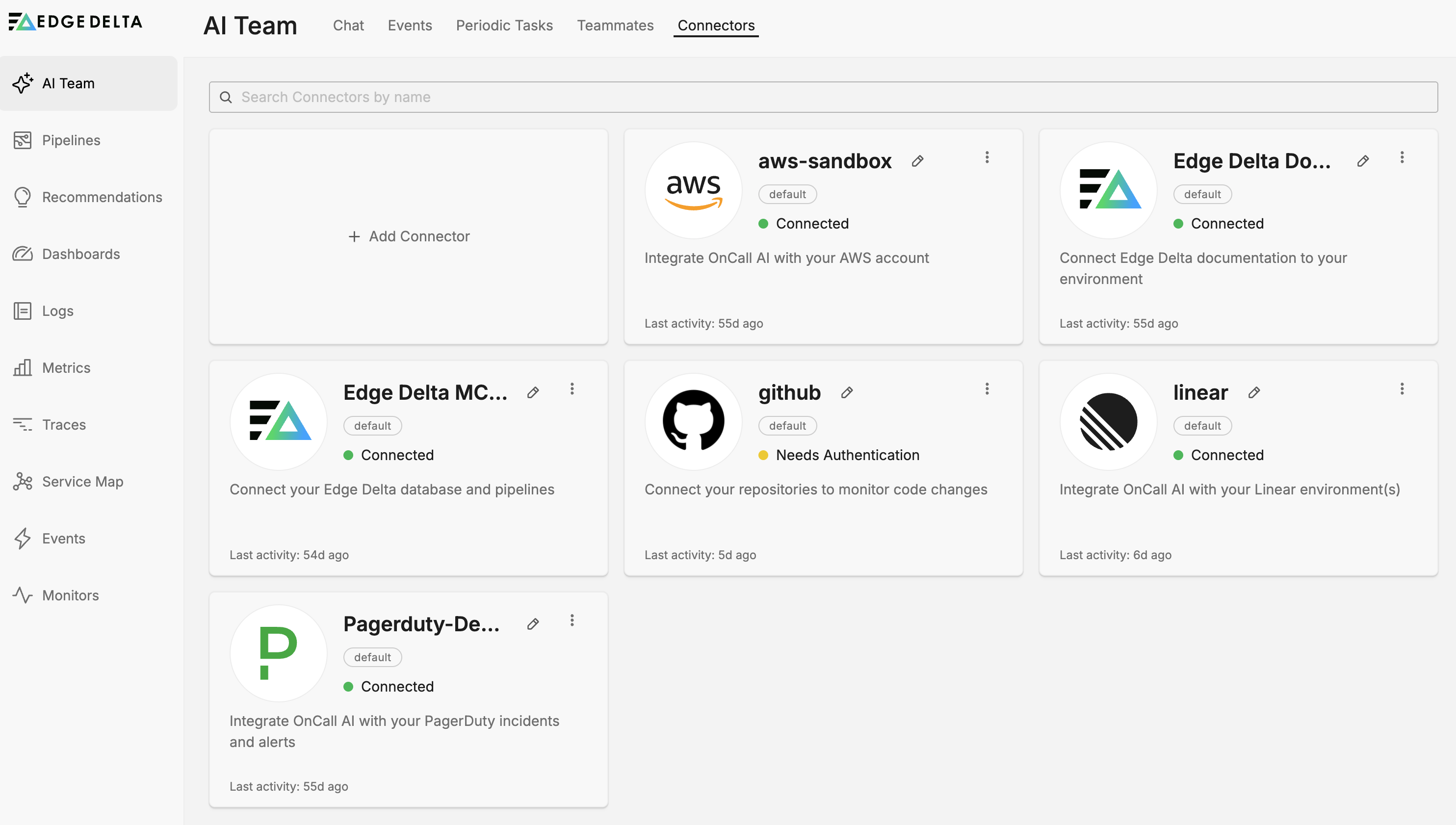
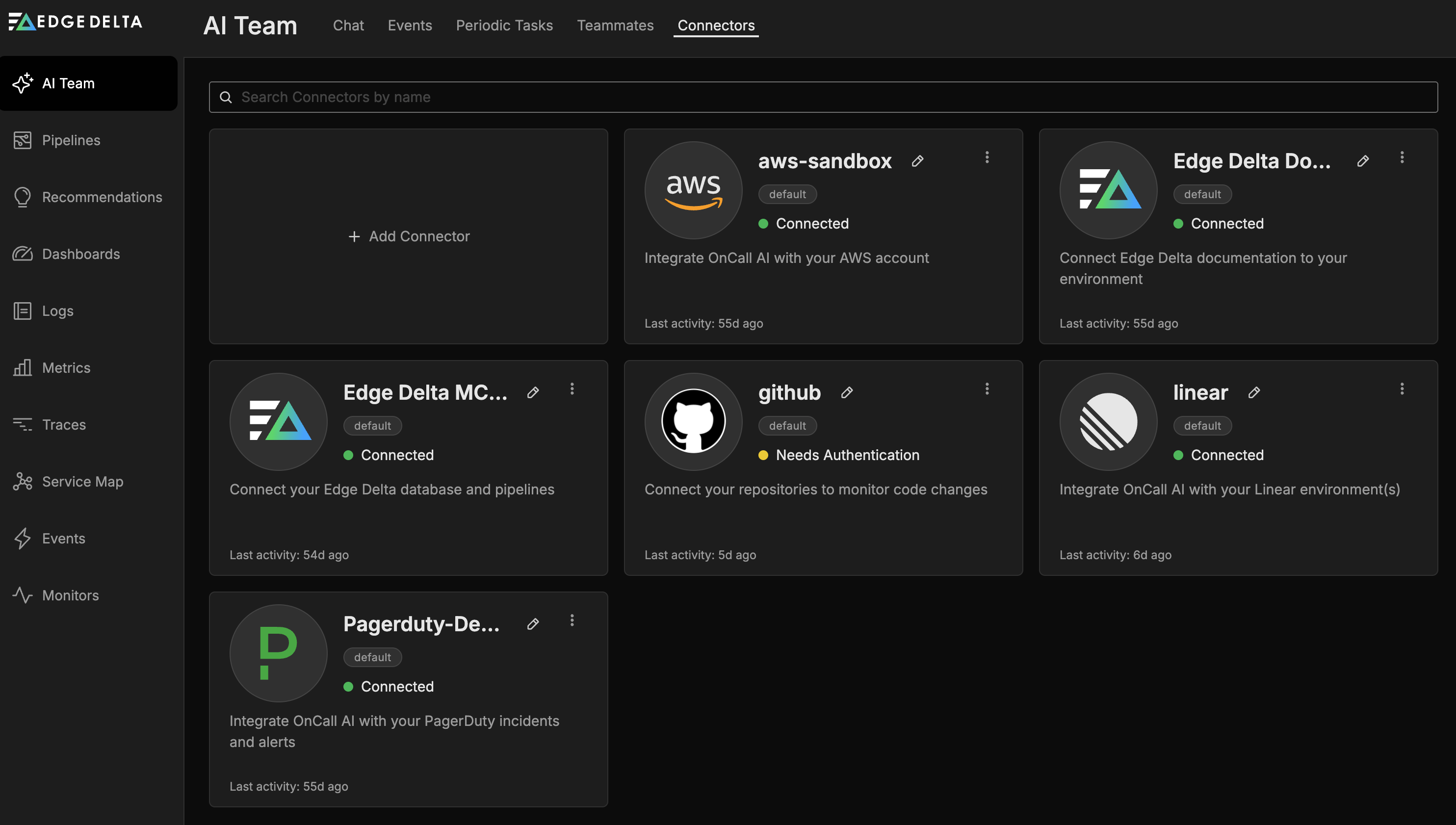
- Connectors overview for the full list of integrations and setup guides
Periodic tasks
Periodic tasks automate health checks, reports, and proactive analysis on a recurring schedule. OnCall AI orchestrates their execution and posts results as threads in the assigned channel.
- Periodic Tasks for scheduling and management
Use cases
End-to-end investigation scenarios show how teammates collaborate to resolve real operational issues, from anomaly detection and security degradation to CI/CD failures and Kubernetes troubleshooting.
- Use Cases for complete setup guides and data-flow walkthroughs
Monitoring and settings
Track teammate performance, manage AI model selection, configure memory retention, and set usage budgets.
- Events for viewing all activity that triggers AI responses
- Performance for teammate scores, response times, and token usage
- Settings for model defaults, memory, and usage limits
- Security Best Practices for permission models and compliance
- Edge Delta Trust Center for AI data privacy, model provider details, training data policies, and responsible AI commitments
Getting started
When you are ready to bring the AI Team into daily operations, start with the Getting Started guide for channel creation, teammate configuration, and connector setup.